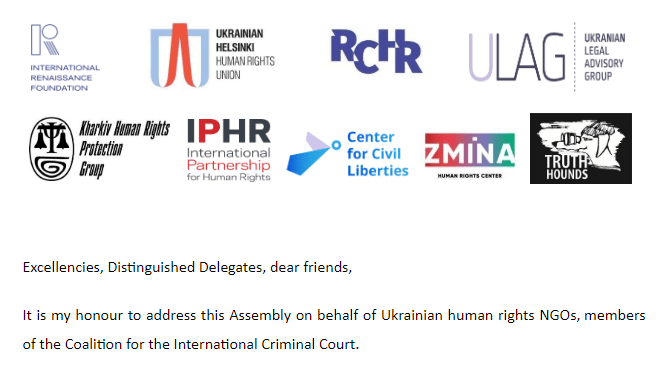
Excellencies, Distinguished Delegates, dear friends,
It is my honour to address this Assembly on behalf of Ukrainian human rights NGOs, members of the Coalition for the International Criminal Court.
We highly appreciate your commitment to and are grateful for your tireless efforts in fighting for justice worldwide and we, as members of Ukraine’s civil society, stand in solidarity with all of you and those who continue the global fight against impunity.
In 2014 Ukrainian people fell victim to the armed conflict in their own territory: Crimea was illegally annexed and occupied by the Russian Federation resulting in mass detentions and ill-treatment of civilians, forcible transfer of local population, kidnapping and murder of activists, enforced citizenship, and forced conscription into the army of the Occupying Power. Part of Ukraine was forced into armed hostilities instigated and supported by the Russian Federation, which in 6 years have resulted in 13 000 dead, 30 000 wounded, 3500 detained, 50 000 destroyed buildings as a result of shelling, and the shooting down of a civilian aircraft with 298 people aboard, including infants. This is just to name some of the consequences of the conflict.
There is a clear need to hold the perpetrators of grave international crimes accountable. Ukraine has recognised the role of the ICC in addressing impunity, not least with the two formal declarations submitted to the ICC on 17 April 2014 and on 8 September 2015, under Article 12(3) of the Statute, and in the case of the latter, accepting the exercise of the ICC’s jurisdiction in relation to alleged crimes committed in the territory of Ukraine from 20 February 2014 onwards. Ukraine also acceded to the Agreement on Privileges and Immunities of the Court (APIC) on 29 January 2007.
Furthermore, Ukraine committed to secure Rome Statute ratification and implementation as part of the European Union-Ukraine Association Agreement (Article 8)1. There is now no legal obstacle nationally to ratification, which is fully in line with the European Union’s policy of strong support and commitment to international justice and the ICC.
We also take note that during the United Nations General Assembly plenary meeting on the responsibility to protect and the prevention of genocide, war crimes, ethnic cleansing and crimes against humanity, held on 28 June 2019, in New York, Ukraine’s Representative, referring to the constitutional amendment adopted by the Parliament of Ukraine in 2016 delaying the possibility of ratification by 3 years, noted “We (Ukraine) removed internal legal obstacles in the way of Ukraine’s ratification of the Rome Statute of the International Criminal Court and actively work on preparation of legislation aimed at implementing the Statute.”
Despite reassurances of adherence to the rule of law and international legal order, however, the government of Ukraine is yet to ratify the Rome Statute and join the ICC’s 122 states parties in promoting its universality and joining the global fight against impunity.
In this regard we, as civil society, also welcome the decision of the EU Network for investigation and prosecution of genocide, crimes against humanity and war crimes to refuse the request of Ukraine for observer status and make resubmission of the application conditional upon Ukraine’s ratification of the Rome Statute and implementation of the relevant crimes in its domestic legislation.
As civil society we continue to remain fully dedicated to advocating and promoting ratification and implementation of the Rome Statute into national legislation by adopting draft bill 0892 in second reading and adhering to the principle of complemetarity, a central principle of the Rome Statute system. Thus far the most concrete achievement with regard to ensuring accountability of both the domestic authorities and civil society has been the October 2019 setting up of a specialised department within the prosecution office tasked with overseeing investigations of grave crimes in the armed conflict. However, without additional measures, and the political will and genuine intention of the state of Ukraine to ensure impartial and independent justice for the victims of the conflict, our joint best efforts continue to be moot.
We are also well aware of the fact that the ICC’s system is undergoing a review process as a result of its continued underperformance with the view to strengthen it and to make it more efficient and effective, including when it comes to ensuring sufficient state support. We, as civil society, wholeheartedly support such endeavors. Furthermore, we realise that one of the most effective ways for Ukraine to strengthen the Rome Statute System is by joining it.
To this end, while we are hoping for the Office of the Prosecutor’s prompt decision to open an investigation into the situation in Ukraine, we would also like to ask the ICC and its member states to continue to encourage and urge the Ukrainian leadership to ratify and implement the Rome Statute as soon as possible, thereby creating necessary legal framework for ensuring justice for the victims of grave crimes; and to share your knowledge and expertise of building effective war crimes departments within Ukrainian prosecutorial and investigative authorities and other measures across the judicial system to support credible national proceedings.
Finally, the 1st Normandy Summit in the past 3 years is scheduled to take place on 9 December 2019 and it is imperative that while leaders of Ukraine, Russia, Germany and France are searching for a political and diplomatic solution to bring peace to Ukraine and security to the rest of Europe, justice does not become a bargaining chip.
We, in turn, would like to reassure of our dedication and continued cooperation in promoting peace, justice and ending impunity globally.
Thank you for your attention.

